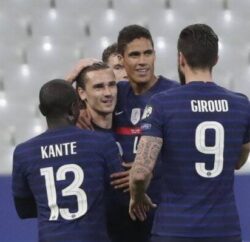China’s team sports in men are floundering despite years of effort and money put into basketball, football and volleyball, the three that the country covets global success in.
It comes in the way of China being recognised as a sporting powerhouse, despite its deluge of medals in individual disciplines at Olympics.
We talk to a close China watcher and expert on the subject, Simon Chadwick, who is Director of Eurasian Sport at Em Lyon Business School. Chadwick has observed the trends of change sweeping team sports in China, mostly football, and explains the curious dichotomy through an anthropological lens.
As a relatively young sporting nation (they only emerged internationally in 1980s), is China struggling to put together world-beating teams in (big-ball) team sport, rather than individual disciplines?
I’m not sure I would agree that China is young in international sport. We know there’s been a Chinese process in place for decades. There’s more fundamental issues for China. Like for example the absence of a football culture. It’s not a football nation so this notion of team success in football is an important one. Also it is very interesting point about indivisualism. Contrary to popular opinion, China is a very individualistic society where success of individual people within individual families is much more important very often than collective well being. And it is a common myth that because of a communist background of the country, the collectivism helps to bring people together.
You got to remember that other sports like basketball, badminton, TT, dragon boat racing are much more important to Chinese than football. In summary I don’t agree that China is incapable of or is going to struggle to put football teams together. There are broader forces at play based around Chinese culture, existing predisposition for certain sports, that might be a help or hindrance to some sport in all this.
When you say ‘culture of pre-disposition of certain sports’, what’s lacking in football?
There is no culture of playing football in China. Period. Someone like me – I was born and brought up in England where I had a father and grandfather who were season ticket holders. I went to a school where it was football in winter, cricket in summer. It was almost part of my DNA was football. Cricket as well. It’s not part of China’s DNA to play football. Cause they are raised in a different sporting context. Socialised and conditioned in different contexts. So number of players and skill of those players in football has always been an issue. If you are not producing players then subsequent to that you don’t produce managers, coaches. You don’t create the infrastructure To bring successful elite level performance. So it’s quite fundamental, the DNA. You can talk about it being structural, generational.
30 yrs ago Japanese were in the same situation as China. But it takes decades, takes generations to break a culture and bring forward a new culture. So the Chinese struggle. It really doesn’t help that state intervention keeps taking football in different directions. If anything, with President Xi given that we now seem to have a lease of life, maybe there will be some consistency and coherence of strategy. But maybe even in the Xi era, we still see some fairly dramatic changes in direction, in strategy. My view is that it’s affecting the culture change. The vision, the rollout of strategy, the management. They need to be patient. The Chinese football ecosystem is not some English second division football team where if results are not going your way after 10 games, you sack the manager. There is a need for perseverance, patience, direction, continuity and coherence.
 2018 World Cup Qualifiers – Team China celebrates after winning against South Korea (Source: Reuters)
2018 World Cup Qualifiers – Team China celebrates after winning against South Korea (Source: Reuters)
But what explains the national basketball team’s inability to become the best in the world despite massive NBA intervention and support?
If anything, the NBA is a benchmark for development of Chinese football. It’s not that Chinese football is a benchmark for basketball. The NBA has always been very careful, considerate, strategic, proactive, thoughtful about the way it has engaged with the Chinese market.
They build engagement, raise awareness, identify talent, create business revenue streams in China. And this has been decades in the making. My advice to Chinese football authorities in general would be that it needs to look for strategic lessons at not just NBA but English premier League.
The English premier League was the outcome of a review called the Blueprints of future of football which was completed in 1991. By 1992 we had the league. Essentially the blueprint said two things; 1. Make more money. 2. To improve national team. To outline the vision of how English football should change to achieve those two things. We could argue about the national team and it’s performance but certainly in making money, the Premier League is exactly what it set out to achieve. But it took 30 years to get there. So Premier League could be benchmark for what happens to Chinese football.
Are there intrinsic problems at a basic individual, sociological level in putting together successful men’s teams?
Additional dimension I would add is Chinese soft skill development is or has been deficient. If you look at Chinese educational system in hard skills development, it imparts, it is exceptional. And same could be said about Indian educational system. Great scientists, great mathematicians, great historians. People who’ve engaged in rote learning. Can recite texts and can understand history of the world, and how chemical compounds are comprised. But if you look for example at the British educational system, much greater soft skills – decision making, independence, creativity, innovation, teamwork, problem solving. These are deficient not just from Chinese educational system but from Chinese football. I’ve spoken to football coaches who coached in China before. And when they threw a young kid the ball and the kid has just looked and said ‘What are we supposed to do with this?’ Now for someone like me, a kid in England, you get the ball they don’t need to be told what to do. But in China, such is the educational system, such is the centralization of power control in China that Chinese kids often don’t know how to kick a ball unless they’re told how to do it.
What separates individual sport from team sport in China?
In track and field athletics the Chinese have gone very far, very fast. Individually they are great. Same in badminton. I don’t think it’s beyond the Chinese to be successful football players. In fact the Chinese women’s team is always ranked higher and performed much better, strongly at the world Cup. So we know the Chinese are capable of it, but there needs to be focus not just on soft skills development but also on techniques of football and embedding culture of football within Chinese society which obviously is in younger age groups but in all middle and high schools all Chinese are expected to play football at least once a week. But even that is not going to yield returns on investment in 5 years, 10 years, possibly in 20 years.
Japan, South Korea never qualified for the World Cup 30 years ago. They didn’t do well in international competitions, you certainly didn’t have the flow of talent from Japan in Bundesliga. But South Korea and Japan have done it. Arguably not as strong as England or Italy or Spain or Germany. But they have made great strides forward. So we got to look at China over decades, not just few years from now.
Does quality of domestic leagues indicate good health of team games?
England, you have the domestic pyramid in the League. Germany you have a series of regional leagues. US you have college sports as a feeder. And China have been looking towards these different models. But what I’m not sensing right now is China have decided upon the best way to do this because we know that they are promoting University sports. But there doesn’t seem to be a particular connection between uni sports and professional athletes-structure. We know that China is trying to get university teams to participate in regional leagues in Germany. But that backfired for a whole number of reasons. China is a huge country and a regional league would make sense in many ways. But we are not seeing that progress. Yet. There doesn’t seem to be a particular view on regional leagues. The Chinese want to replicate the British pyramid but they really need to get into grassroots development, embedding sport within a culture. Also to make pathways for those who don’t make it in professional sport. Lots of decisions and examples to draw. But China needs to be more decisive and clear about which way to go.
Is pouring in money the solution to improve team sports?
Money alone is not enough. Culture trumps everything. Just because you pay someone to do something it doesn’t mean a culture gets established. Culture comes from years of repetition. You know this from cricket in India. It’s years of repetition. People are born and brought up, conditioned to it, they play, they watch it, they engage with it in different ways, so that it becomes normal and natural and it’s not seen as exceptional. I think at the moment there is something contrived about what China is trying to do. Because for most Chinese people, I emphasise this very strongly, for most Chinese people, football is not part of their lives. Their culture of sport. Its not naturally something that they look for entertainment or physical activity or exercise. So it’ll take effort.
What does it take to make a good national team?
Patience, openness, it’s got to be something that happens over at least a decade. You got to open your heart, your mind to different ways of doing things, different ways of playing, organising, training, different influences. It’s about heroes, icons, role models, its about success and about giving people reasons to cheer a team. At the moment I don’t think the Chinese have reasons to cheer a national team which underperforms.
Is Japan then a better model for team sports?
Combination of corporations and prefectures and clubs working together collectively is what’s working for Japan. As equal, trilateral partners. For me each one shows respect for the other, so it’s collaborative. In China one of the big issues is the state is omnipresent. It’s there in the background, waiting to intervene. And we know this prescribed way of living can be incredibly constraining when it comes to successfully trying to organise, trying to train people to make their own decisions. Talking specifically about football players, making decisions on the field of play.
It’s interesting to compare Chinese society with Saudi Arabia’a top football clubs. Now what Saudi Arabia is trying to do is to privatise those clubs because the Saudi government believes by privatising them it forces them to become more business like and strategic in how they operate. They’re not constantly looking for state handouts, for state to tell them what to do. They’ve got to make revenues, make good commercial decisions. They’ve got to manage labour, their players, the passion and there are lessons there that excessive state intervention – and keep in mind I’m not arguing here for excessive free market economy for governing Chinese football. But mixed economy is the best way to put it. Mixed economy of Chinese football needs to be strengthened. So football needs to be far less a state instrument. And far more a social democratic institution.






